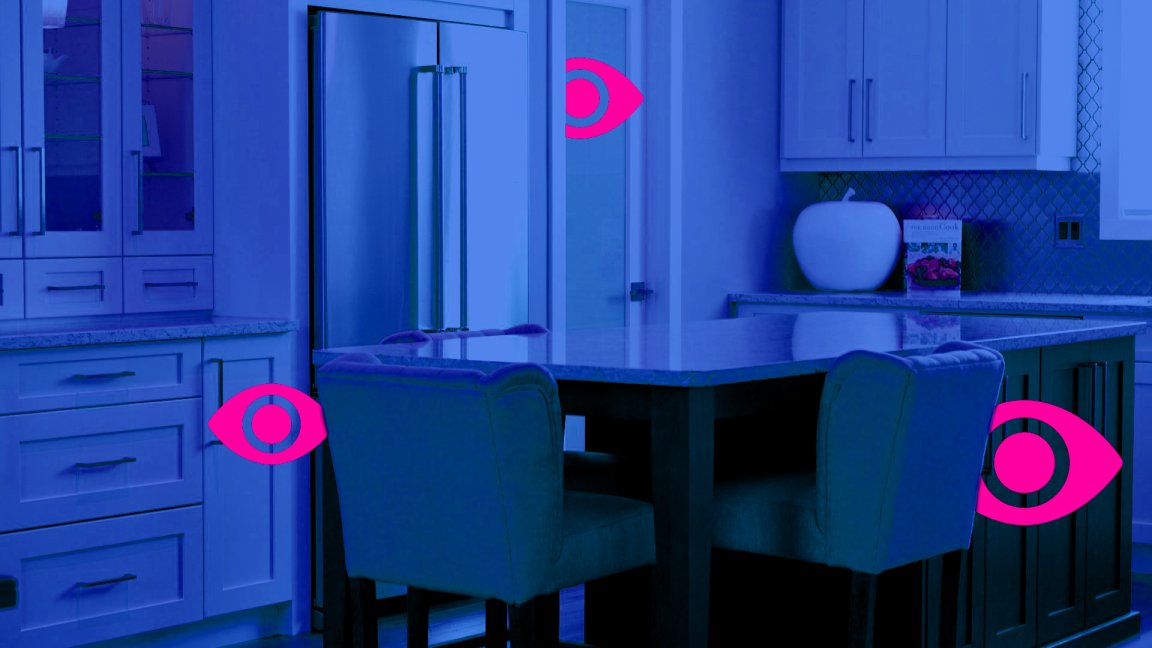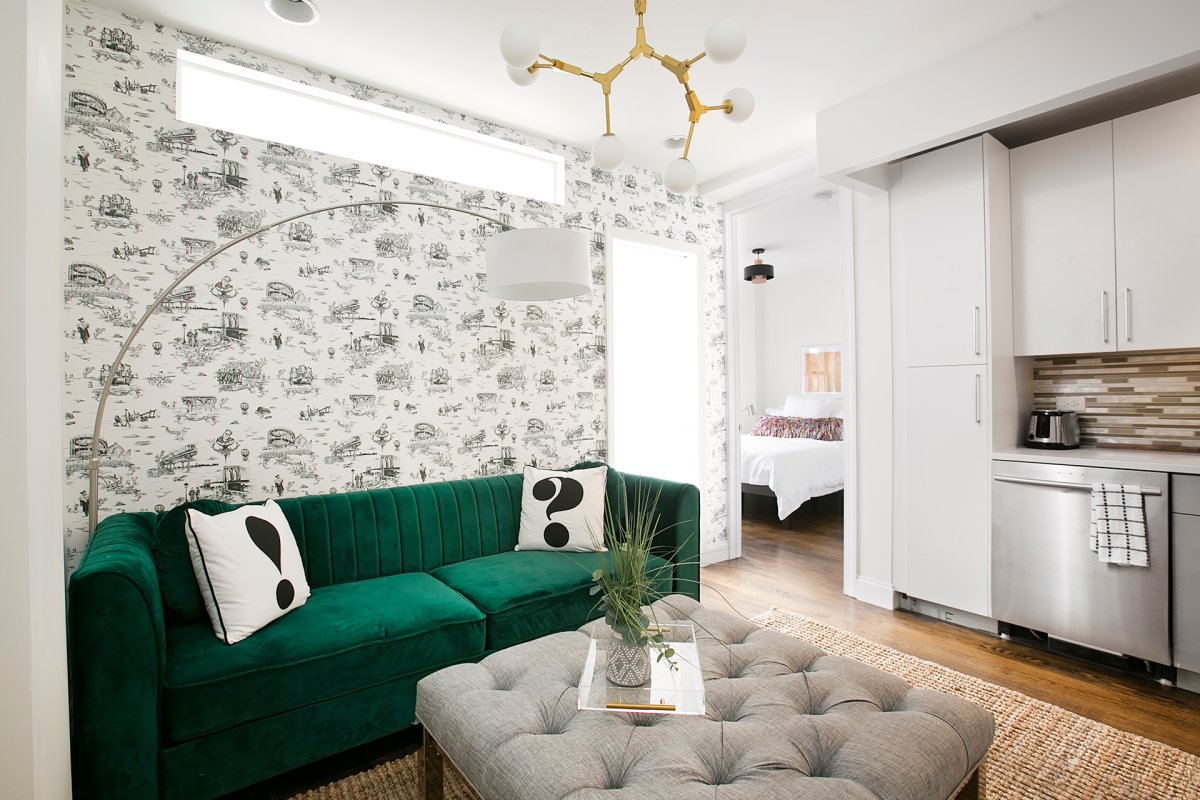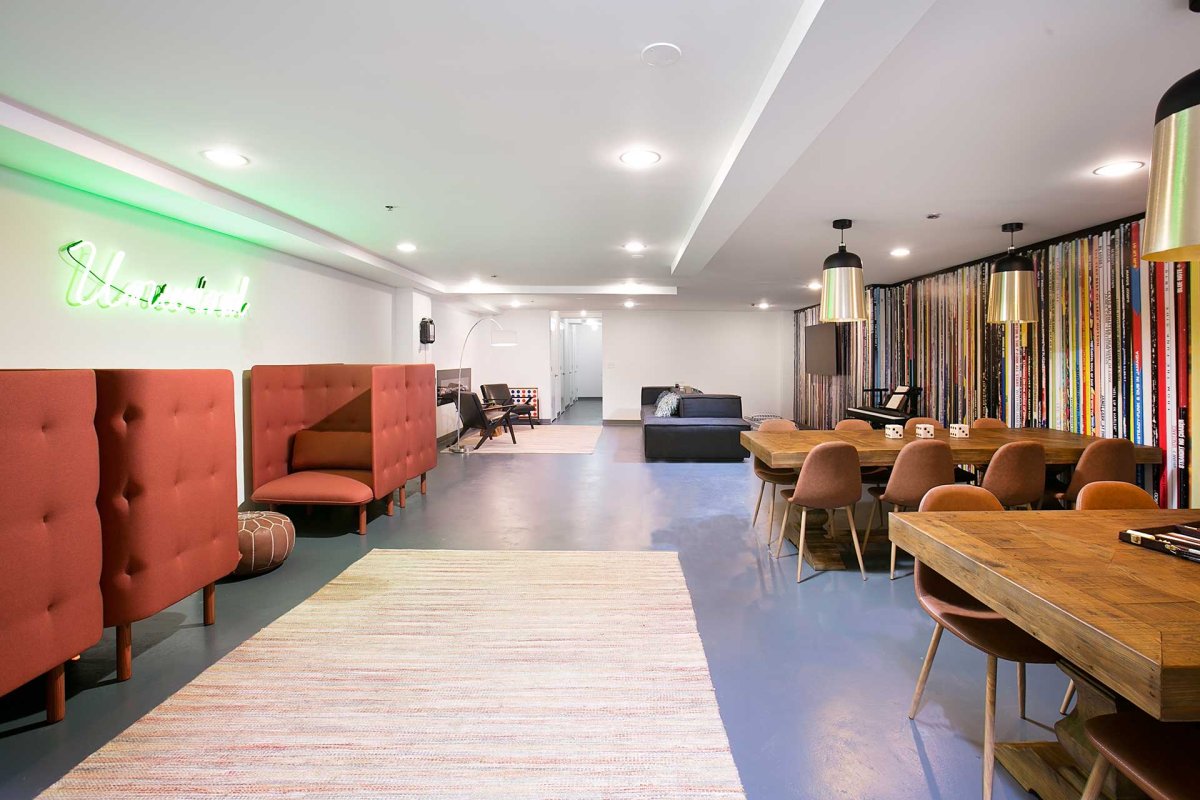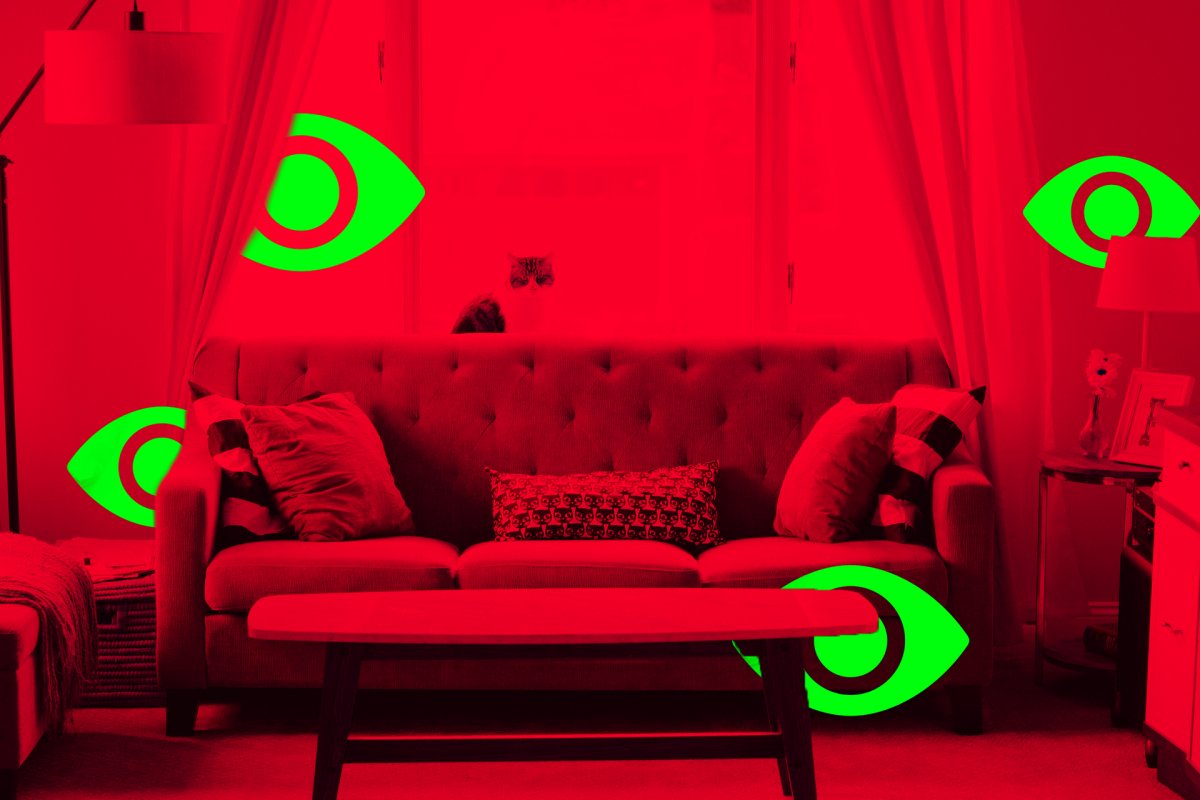
I follow the narrow hallway. It’s covered with exhaustingly-hip custom wallpaper of faces that look like they’ve been cut out of a fashion magazine, placed in a grid formation, and drawn on. I emerge into the sort of bright, minimalist white-walled apartment that only seems to exist on Instagram. Individual lights flick on as I walk around the furniture of the small living room. I pause, thinking I might have disturbed someone. I haven’t — the apartments’ motion sensors spotted me one by one as I stepped beneath each light.
“Hey Google, I’m home,” says Avi Lichtenstein, my tour guide and mock real estate agent for the day. Lichtenstein is the COO of Roomrs, a high-tech smart housing company geared for millennials new to New York City and want hassle-free housing on a young professional’s budget.
The Google Home sitting on the counter — a standard feature found in all Roomrs apartments, along with smart locks, smart mattresses, smart windows, smart outlets, smart lamps, smart air conditioners, and smart TVs — quips: “Hey roomie.”
The Google Home informs us that one of the building’s tenants has a birthday coming up and suggests taking her to a local steakhouse that’s offering a 20 percent discount, courtesy of their partnership with Roomrs. If something in the room wasn’t working properly — a leaky shower head, a squeaky door — I could have reported it there, using Google Home the way others might ping their Super. Lichtenstein tries this, saying: “Hey Google, my faucet is broken,” the Google Home rants on and on about plumbing services until Lichtenstein leans over again minutes later. “Hey Google, shut up!”
Roomrs (also spelled Roomors and Roomers at various places on the company’s website) emerged in 2017 as a community-centered housing startup designed to give young professionals a sweet pad where they can get acclimated to a new city, all as stress-free as possible. Rent payments cover Wi-fi, furniture, and cleaning services. They also cover utilities as long as tenants stay under their electricity cap, and the suite’s worth of smart gizmos. That’s great, assuming that being surrounded by gadgets that monitor and quantify your lifestyle is the sort of thing that won’t stress you out.
While Roomrs doesn’t sell the data it collects about tenants, it may be one of the first of a new generation of apartments and hotels that let people stay for cheap, as long as they give up their notion of privacy.
It’s as stress
free as possible, unless being surrounded by gadgets that monitor your lifestyle stresses you out.
The typical Roomrs resident is young, in the early years of their career (Lichtenstein couldn’t share the average income of a Roomrs tenant, but that it was a wide range since they admit anyone from students to full professionals). They’re a digital native and marinated in the quantified self movement, so they’re unafraid of the ways technology has integrated in their lives. They’ve probably moved to New York for a new job or project (tenants can stay at Roomrs for as little as three months and up to a year, with the option to renew after that) and also looking for a way to conquer the impossible task of making friends as an adult. For this very specific segment of individuals, Roomrs can be a one-stop shop.
The application is pretty straightforward — questions about your budget, ideal move-in date — though the question “what are you doing in the city” is required.

Here’s a typical day in the life of a Roomrs resident: Your phone, using the sleep-aid app Eight, wakes you up within the timeframe you wanted to start your day at the ideal point in your sleep cycle. As you review your sleep score — a grade out of 100, which factors in how long you took to conk out and how many times you tossed and turned, all measured by your Eight-connected smart mattress — your blinds automatically rise to let in sunlight. The lights switch on as you walk into your living room, usually (but not always) shared with two to three other people. You check in with your Google Home, which tells you what’s up with some of the other tenants, perhaps ad nauseam.
From there, you can go to work or, if you’re one of the city’s growing population of remote workers, you can go to the basement, roof, or backyard, sign into the Wi-fi, and work surrounded by custom spray-paint murals. When you’re done for the day or simply want a break, you can attend local events, group activities, or restaurant recommendations organized by Roomrs that perfectly cater to your interests.
These recommendations come from all the data they collect about you and your lifestyle. Thanks to the carefully curated ensemble of smart technology, Roomrs knows when and how much you sleep, your TV habits, food preferences, and even how much time you spend in various places in your apartment. Based on their back-end programming, this turns into tips for how to sleep better, restaurant suggestions, and even advice on how to conserve energy if, say, your gadgets notice you ran the AC in your bedroom all day. Roomrs supplements all this data with any publicly-available information that the company can find on each tenant, which it adds to its database.
If the idea of all those devices monitoring you and trawling the internet for stuff about you starts to take away from your sleep score, the only way to opt out is to specifically rent one of Roomrs’ separate apartments that comes without the smart tech. Or, you know, live somewhere else.
Lichtenstein knows how this sounds. The idea of an apartment that learns everything about you, well, it could make some people uncomfortable. In an era with near-daily data privacy scandals and companies that leak personal information like its their job, it’s easy to raise an eyebrow at the growing record of information that these smart apartments collect. But Lichtenstein clarifies several times that Roomrs doesn’t sell any of the data they collect on people. As long as Roomrs remains transparent about how it collects information to make personal recommendations, Lichtenstein says, the company shouldn’t run into any problems.
“People understand that data is being collected wherever you go,” Lichtenstein tells me over the phone before my visit. “You have a cell phone, you have a Gmail — data is being collected. People weren’t upset that Facebook sold their data, they were upset they didn’t tell them.”
People weren’t upset that Facebook sold their data, they were upset they didn’t tell them.
For now, Roomrs doesn’t have to sell user data. It makes its money like any other landlord would. In fact, Lichtenstein says the company brings in about 25 percent more money than a traditional landlord arrangement. That’s in part because the company buys furniture in bulk, so setup costs are low. Each apartment ends up looking more or less the same, making Roomrs not unlike a hotel, except that guests stay longer.
The rest of that extra income comes from the higher rent. A single furnished bedroom in a three-bedroom apartment in Roomrs’ Williamsburg building costs $1,850 per month, just shy of what it would cost to rent your own one-bedroom apartment in the neighborhood. Prices vary depending on the neighborhood you live in — Roomrs also has locations elsewhere in Brooklyn, as well as in Harlem and the upper east side. Some of these, like their Ocean Hill, Brooklyn apartments, come in much cheaper at $1,200 per month, and Roomrs also has a scholarship program that covers one semester of rent for undergraduates who give back to the community.
With Wi-fi, electricity, and all of the smart tech that comes with it, moving in for the minimum three-month lease is certainly more affordable than trying to upgrade a normal apartment on your own. (There’s no denying that Roomrs’ ability to make more money comes from renting out bedrooms at the cost of entire apartments). And with a washer/dryer and dishwasher in each unit, Roomrs tenants (I refuse to call them “roomies”) already have a technological leg up on most New York housing.

So while the “affordable” part of Roomrs’ premise is a bit of a stretch, it’s a hell of a lot cheaper than the other “apartments of the future” found in New York City, which are usually multi-million-dollar condos designed for the sort of people who have never in their lives struggled to find housing. Though that doesn’t necessarily mean that Roomrs tenants are any worse off than the people who can afford their own IMAX theaters — they’re just probably younger.
“We’re not a big data company. We’re a high-tech solution to make housing simple and take away all the stress, while providing an amenity that’s desperately needed at a very affordable rate. That’s our focus, that’s our goal, that’s our vision,” Lichtenstein says.
So if Roomrs isn’t selling tenants’ data, what is the company doing with it? Lichtenstein says Roomrs uses the information it collects to program the network of Google Homes with updates and recommendations. Take, for example, energy use — each tenant is allotted a certain amount of electricity as part of their amenities-included rent. If Roomrs realizes that the air conditioning and lights are always running in one person’s room but not the other bedrooms in that apartment, the company could rework the system to make sure the more energy-conscious roommates aren’t paying extra. The building manager could also, in theory, check in and see if that person is sick or otherwise in need of help.
“I believe [personal] data is everywhere,” Lichtenstein muses as we stand on the rooftop patio of Roomr’s flagship building in Williamsburg, Brooklyn. “You just need to know how to use it responsibly.”

And while Roomrs seems to be using tenant data responsibly for now, that could change quickly, even if the company isn’t talking about it today. Just look at what happened with personal genetics company 23andMe — lots of people shared their genetic information with the company to learn about their ancestry and risk for certain conditions, but many were surprised when the company later sold its database to pharmaceutical company GlaxoSmithKline.
This is, of course, all speculation. As Roomrs snaps up individual apartments and whole buildings in New York City, there’s no reason to suspect that such an acquisition is coming nor is there reason to doubt that Roomrs is as responsible with tenant data as it claims to be.
But Roomrs will not be the only company to wire its apartments with cameras and microphones. Some are already here, such as Ollie, which for now focuses solely on co-living spaces, not individual apartments. These companies may leverage a new sort of deal — rent below market price in exchange for 21st century gold (namely tenants’ infinitely sellable, sweet, sweet data) — that could take off as rent hikes make New York unaffordable for growing numbers of people.
As these companies spring up and adapt business models similar to Roomrs’ (or perhaps more insidious), we’re all going to have to get better at reading the fine print.
To read more about futuristic housing, click here: Dubai’s High-Tech, iPad-Shaped Apartment Could be a Troubleshooting Nightmare